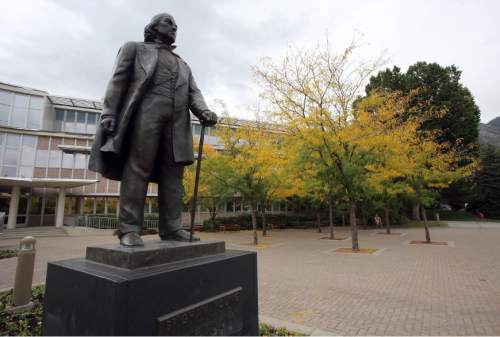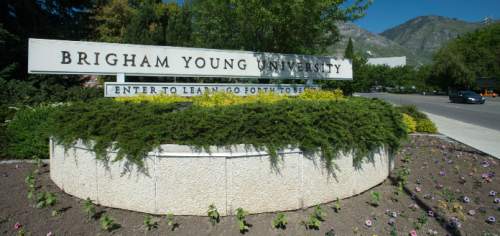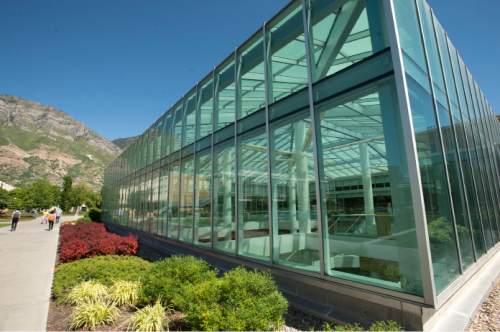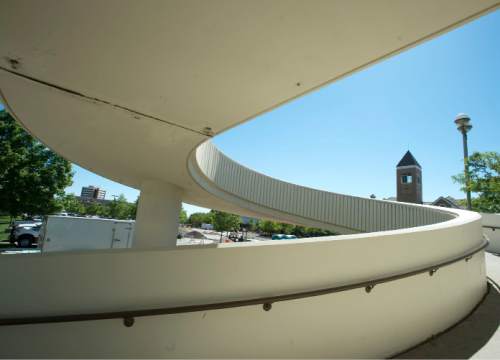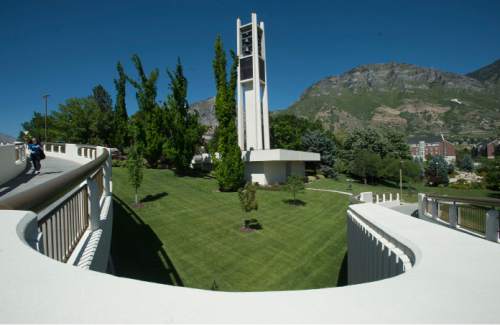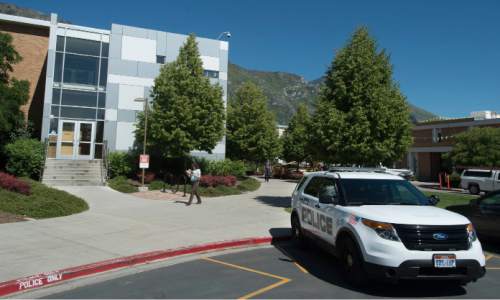This is an archived article that was published on sltrib.com in 2016, and information in the article may be outdated. It is provided only for personal research purposes and may not be reprinted.
The Utah Department of Public Safety is investigating Brigham Young University's police department and how it accesses and shares its own police reports and the records of other Utah County police agencies.
Since students began coming forward this spring, alleging they were investigated by BYU's Honor Code Office after reporting sexual assaults, campus police repeatedly have stressed that they are separate from that office and do not report conduct violations to the school.
However, The Salt Lake Tribune has obtained BYU documents that show that a BYU police lieutenant accessed a countywide database of police records to collect information from another department for an Honor Code investigation in at least one case: the school's probe of Madi Barney, who has called for changes in how BYU handles sexual-assault reports.
DPS said Wednesday that its Bureau of Investigation will "review information access and dissemination issues including any possible violations related to the sexual assault reporting situation at BYU made public last spring," according to a written statement.
The investigation was requested by BYU and Provo police departments, according to DPS and the agencies.
Marissa Villasenor, public relations director for DPS, said BYU police Chief Larry Stott asked for the probe, but added there is not a specific case or allegation driving it.
"We're trying to find out, is there a reporting situation?" she said. "Are reports being handled correctly? Is everything being handled appropriately when information comes in? Where is it going?"
Villasenor said investigators will examine not only how BYU police files are shared, but also what happens when campus officers access reports from other Utah County agencies — including police departments in Orem and Provo, and the Utah County Sheriff's Office — and whether those reports are shared with others.
Provo police Sgt. Brian Taylor said his department also sought the review of campus police.
"We are required by law, as any police agency, to safeguard sensitive reports during investigations," he said. "So when we learned that our reports were the subject matter of Honor Code investigations, we referred that to DPS."
BYU police Lt. Steven Messick said the department wants to ensure it is following state policies. "We just want to make sure we are acting the way that we should," he said.
Utah County agencies have access to one another's police files because they use the same software company, Spillman, to file cases and book evidence.
Police officers must have a legitimate law enforcement purpose when accessing the multiagency system, according to Taylor. An officer needs a login and password to enter the system, Taylor said, and a detailed log is made every time an officer accesses a report.
The Tribune filed several public records requests on May 25, asking for logs showing when BYU police accessed sexual-assault-investigation reports from Provo, Orem and the sheriff's office. All three departments have denied the requests, citing the DPS investigation.
The investigation was opened May 26, according to the denials. Villasenor said the timing of the investigation is unrelated to The Tribune's records requests.
Barney in September told Provo police that Orem resident Nasiru Seidu raped her during a date in her off-campus apartment. After Seidu was charged with first-degree-felony rape, he gave a copy of the detailed rape report to a Utah County sheriff's deputy, who took it to BYU.
But BYU documents, obtained by The Tribune and verified by Provo police, show BYU police already had used the Spillman database to access those Provo police records — apparently at the behest of the Honor Code Office — before Deputy Edwin Randolph brought the file to the school.
According to reports by an Honor Code investigator, or "counselor," Randolph had called the Honor Code Office on Nov. 20, three days before he delivered Barney's file. The counselor wrote down numerous allegations Randolph made against Barney during that call.
The counselor wrote in her report that on the same day, she asked BYU police Lt. Aaron Rhoades to seek information on the rape case.
Logs from the records system show Rhoades accessed Barney's case that day, Provo police reports state. According to an Honor Code Office report, Rhoades described viewing a "long police report with 3-4 supplements," and he relayed intimate details from the file to the counselor.
Barney subsequently was forbidden from enrolling in future classes unless she submitted to an Honor Code investigation, which a prosecutor unsuccessfully asked the school to delay until the criminal rape case is resolved. The Tribune generally does not name rape victims, but Barney has agreed to be identified.
The Tribune in April asked BYU police for comment on the Nov. 20 campus-police inquiry into Barney's file. Lt. Arnold Lemmon at that time said BYU police looked at the file because Provo investigators initially accused them of reporting Barney for discipline under the Honor Code.
"It had come to our attention, so our officer looked at the case file, which, there's absolutely nothing wrong with that," Lemmon said. "The bottom line is, the Provo City officer made some assumptions."
However, BYU's reports and Provo police records show that Provo police first contacted BYU about the issue on Dec. 3 — almost two weeks after the log showed BYU police viewed Barney's file.
Barney said herself she didn't know BYU was investigating her until Nov. 25, and she first alerted Provo police to possible witness retaliation after that, triggering Provo's investigation.
Lemmon said BYU police officers are allowed to access cases in other jurisdictions.
"Many times it may not be our case directly," Lemmon said. "If we learn ... we have a student who's a victim in the community, we'll often look at another agency's case file. ... There's a myriad of reasons agencies look at each others' reports."
In the email asking Rhoades to look up information, the Honor Code counselor does not appear to portray Barney as a crime victim. Instead, she begins, "Hi Aaron, I just took a report alleging that one of our students (Madison Barney) has falsely accused a community member ... of rape."
Barney said she finds it "ridiculous" that BYU police accessed the file. But she said she is even more distressed that police didn't wave the Honor Code Office off her case after reading her detailed report.
"The fact that they could read through that and just not care makes me want to throw up," Barney said. "That they would read about the violence, the screaming, the crying — I don't see how any human being could read through that and have anything but compassion."
Neither Rhoades nor Lemmon returned messages left Wednesday by The Tribune.
Messick said no police employee is on leave because of the DPS investigation. He said the department does occasionally suggest students contact BYU's Title IX Office, which investigates complaints of sexual violence and forwards findings in substantiated cases to the Honor Code Office. But he said he doesn't believe the police are sharing documents with either office.
DPS officials said the results of their investigation could be forwarded to the Utah County Attorney's Office "if appropriate," but no one from the office could specify which rules or state laws regulate the sharing of police records from the joint Utah County database.
According to Utah's Government Records Access and Management Act, any public employee who has lawful access to protected records and who improperly shares that information could be charged with a class B misdemeanor, which carries a maximum penalty of six months in jail and a $1,000 fine.
BYU has said it is taking significant steps, including forming an advisory council, to explore its handling of sexual-assault cases and make recommendations for change. It has said a student "will never be referred to the Honor Code Office for being a victim of sexual assault." The Honor Code at the school, owned by The Church of Jesus Christ of Latter-day Saints, includes a dress code, bans on alcohol and premarital sex, and other rules.
BYU spokeswoman Carri Jenkins said the council welcomes feedback from the DPS investigation. "This invitation," she said, "is part of BYU's broader efforts to study and improve the university's sexual-assault-reporting process."
— Tribune reporter Matthew Piper contributed to this story


